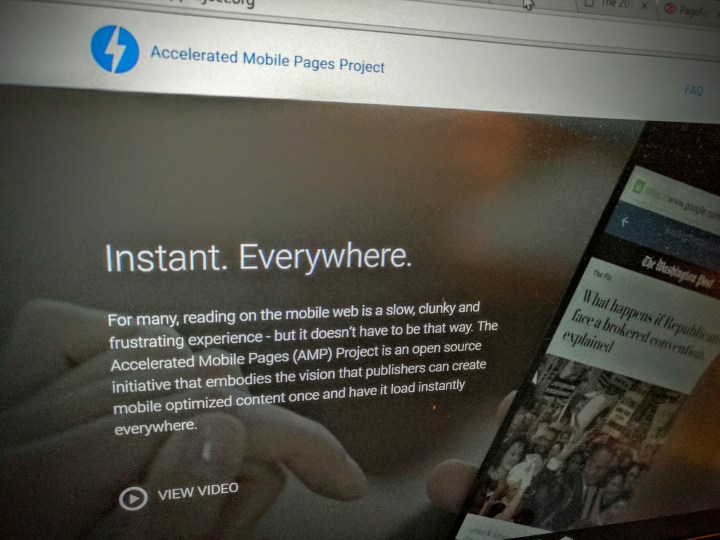
What’s that mean for everyday news junkies, exactly? Nothing dramatic. Perhaps the most visible manifestation of Google’s widened AMP favoritism, a carousel promoting AMP-enabled headline news, will begin appearing at the top of Google News results on the web and mobile. And in Google Search, an icon — a lightning bolt next to the word “AMP” — will distinguish publishers which support the standard from those that don’t. The changes will hit U.S. and English outlets first, with a global push to come in the near future.
The AMP specification, which Google announced in October 2015, quickly attracted the attention of news organizations, ad networks, and content management platforms. Digital Trends, CBS Interactive, Vox Media, The New York Times, and BuzzFeed signed on quickly, as did WordPress.com, AdSense, and more than 100 other partners. The widespread enthusiasm might be partially owed to AMP’s promise: AMP-enabled pages generally load photos, videos, embeds, and adverts faster than your average web page — four times faster on average, Google says — and use as much as 10 times less data.
“People will read more and click on more stories when they know they will load fast, driving more traffic to a publisher’s site,” said Google in a press release. “While we can’t expand the amount of time in the day, with AMP we can help users consume more content in the time that they do have.”

And AMP is arguably better than users’ alternative: ad-stripping software. The popularization of tracking scripts, third-party plugins, and other resource-heavy web page elements — web firm HTTP Archive reports that the average site is two times larger than a year ago — has given rise to tools like ad blockers. According to PageFair, a startup that tracks online advertising, ad blocking ballooned by 41 percent last year to 198 million users in 2015 — growth that cost publishers an estimated $22 billion.
But there’s another, more obvious motivation for publishers to adopt AMP: preferred placement in Google search. In February, Google began highlighting sites that support AMP in mobile results and demoting those that don’t.
Google insists that AMP is only one of the many ranking factors it considers, and points to the framework’s transparency as proof — AMP’s code is freely available on GitHub. Still, the service may be perceived as an effort to establish dominance over similar news-accelerating efforts by Facebook and Apple. Facebook’s Instant Articles and Apple News, both of which provide speedy caches to content creators, do so at the cost of publisher control and revenue: Instant Articles and Apple News require that news organizations use pre-made templates, and both leverage a 30-percent fee on publishers that opt not to sell ads within them.
Whether AMP will prove more successful than Instant or News will ultimately depend on the willingness of users and publishers to adopt it. To that end, Google’s working to improve the way AMP handles paywalls, rich advertising, and analytics. (The Atlantic, for example, partnered with an ad company earlier this year to create AMP-specific ad units.) On the user-facing side, meanwhile, the search giant’s implementing live blog support and experimenting with a sidebar menu that’d suggest related stories from publishers’ sites. Those improvements are set to launch in the coming months, Google says, pending publisher input.
Editors' Recommendations
- Google witness accidentally reveals how much Apple gets for Safari search
- Google to ax its Shopping app in favor of web search
- Google will pay publishers in bid to compete with Apple News
- Google will promote original reporting in its search rankings


